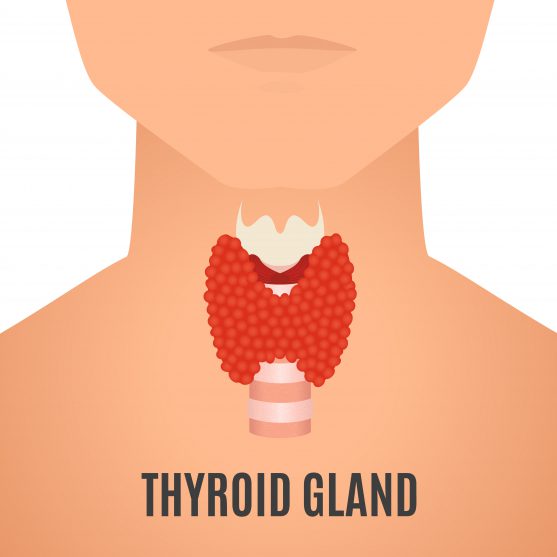Dr Suneel Kaushik Komanduri, Surgical Oncologist, Onco Cancer Centres, explains everything you need to know about thyroid cancer treatment.
The thyroid is a butterfly-shaped gland in the front of the neck. It secretes the thyroxine hormone which helps regulate several body functions. Thyroid cancer is an uncommon form of cancer that develops from the thyroid cells.


With increasing availability and use of diagnostics, more numbers of thyroid cancers are diagnosed. The management of these incidentally detected thyroid cancers remains a challenge. The benefit of treatment should be balanced with the risks associated.
Despite several advances, Surgery remains the cornerstone of thyroid cancer treatment. Owing to its location in the neck and closely related to critical structures, surgery of thyroid is associated with ample risks.
Advances in our understanding of thyroid cancers, newer technology and surgical procedures have made surgery for thyroid a safer and a less morbid procedure in experienced hands.
Not all patients with thyroid cancer require total thyroidectomy. Smaller tumours (less than 4cm and confined to the thyroid) can be treated through removal of a lobe of the thyroid called lobectomy. The feasibility of this limited procedure can be assessed by an oncologist.
However, in some aggressive tumours like medullary cancer the entire thyroid may need to be removed. Less invasive ablation techniques called radiofrequency ablation (RFA) may be considered for small thyroid nodules in patients who are at high risk for surgery.
Owing to its location in the neck and in vicinity to critical structures, thyroid surgery poses risk of change in voice due to nerve injury and imbalance in calcium due to injury to parathyroid glands in the neck.
Meticulous surgery by experienced hands and use of nerve monitoring technology to identify and preserve these nerves reduces the risk of voice damage. Accidental removal of parathyroid may cause imbalance in calcium levels that may need prolonged care. Meticulous surgery is the only way of preventing this complication of thyroid surgery.
A well performed surgery based on the tumour factors is the key step. Effective after treatments are now currently available to reduce the risk of tumour coming back.
Radioactive Iodine therapy (RAI) is one such modality and is effective in killing any residual tumour cells that might have already spread to other organs. This modality is useful for papillary and follicular cancer types. This therapy can be given in multiple sessions when required.
Sometimes, it may be difficult to decipher the exact nature of the thyroid nodule through routine microscopic examination. In such scenarios, we may employ a ‘7 gene signature test’ to decode the true biology of the nodule in question and then plan appropriate treatment.
Genetic testing also helps identify some familial syndromes (like MEN syndromes, Cowden’s etc) that can increase the risk of cancer running in families.
Advanced thyroid cancers can be effectively treated and cured when promptly treated with surgery and RAI therapy. In cases where patients are treated with maximum doses of RAI or disease is refractory to RAI therapy, newer oral targeted medicines are currently available. These medicines effectively control the disease, relieve the symptoms and improve the quality of life of these patients.
కీమోథెరపీ కోసం క్యాన్సర్ రోగులు ఎలాంటి దుస్తులు ధరించాలో తెలుసా? ఈ ఆర్టికల్లో, క్యాన్సర్ రోగులకు కీమోథెరపీని సౌకర్యవంతంగా పొందడంలో సహాయపడే దుస్తుల జాబితాను అందించాము.
ఈ కథనం మీ క్యాన్సర్ రకానికి సరైన క్యాన్సర్ వైద్యుడిని కనుగొనడానికి 6-దశల గైడ్ను వివరిస్తుంది.
तंबाकू का सेवन गुटका, जर्दा, पैन मसाला आदि के रूप में करना सिर और गले के कैंसर का मुख्य कारण…
నోటి పుండ్లతో బాధపడుతున్న క్యాన్సర్ రోగులకు క్యాన్సర్ చికిత్సలో ఉన్నప్పుడు తీసుకోవాల్సిన 12 ఉత్తమ ఆహారాలు.
క్యాన్సర్కు కారణమయ్యే 6 జీవనశైలి కారకాలు గురించి ఈ కథనంలో వివరంగా ఇవ్వబడ్డాయి. అవి ఏమిటో తెలుసుకోండి!
शोध की मानें तो न्यूज़पेपर प्रिंट करने में जो स्याही का इस्तेमाल होता है उसमें ऐसे केमिकल होते हैं जो…